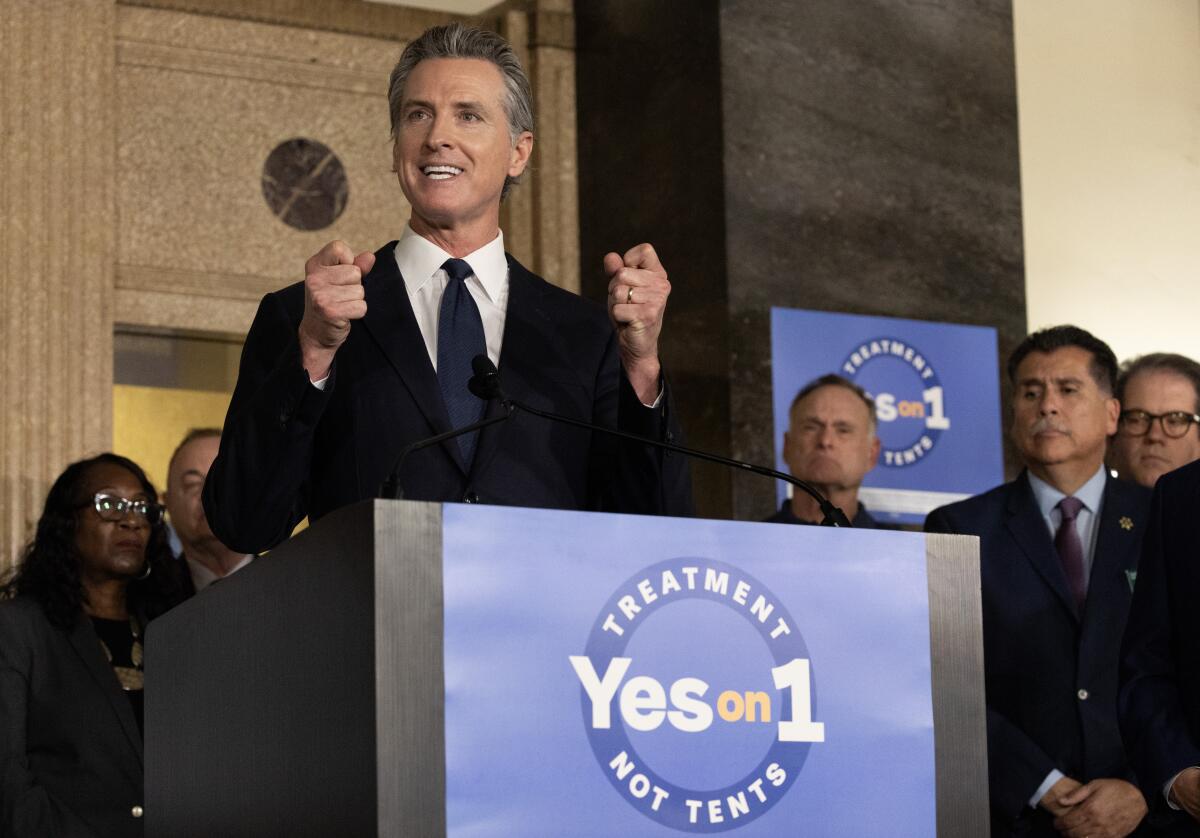Newsom’s Proposition 1 is a shockingly close call

- Share via
It’s been nine days since California’s primary election and we’re still not certain if Gov. Gavin Newsom’s ballot measure has passed.
Proposition 1, the $6.4-billion bond that is core to the governor’s plan to beef up California’s mental health system and get people with drug addiction and psychiatric problems off the streets, was still ahead but by the thinnest of margins Thursday morning: 50.2% to 49.8%, as county election officials continue tallying votes.
Though the meagerly funded opposition campaign conceded this week that the measure was “almost certain” to pass, Newsom has not declared victory and the Associated Press has not called the race because it could flip if outstanding votes skew slightly toward the “no” side.
It’s a rather shocking position for the state’s most powerful official to find himself in.
The measure is teetering for two main reasons, reports my colleague Taryn Luna. One is simply that many Democratic voters didn’t cast ballots. Lower than expected turnout inflated the Republican share of the electorate, a group that doesn’t like Newsom. The other is that Proposition 1 was squeezed from both ends of the political spectrum. Civil rights groups on the left were concerned about the repercussions of funding mental health hospitals, while opponents on the right scoffed at the estimated $14-billion price tag amid a massive state budget deficit.
Columnist George Skelton has another explanation: hubris.
“Gov. Gavin Newsom should have learned this four years ago: You don’t try to sell voters on more government spending in a primary election,” Skelton writes.
The bond measure would have likely performed better in November, Skelton argues, when turnout among Democrats is typically higher.
“Perhaps if the governor had focused more on selling his confusing ballot measure and less on promoting his national political profile, Proposition 1 would have fared better. But mainly, the proposal did worse than expected because it was placed on the wrong ballot — despite Newsom raising more than $20 million for the campaign and opponents spending virtually zilch.”
I’m Laurel Rosenhall, The Times’ Sacramento bureau chief, here with your guide to the week’s biggest news in California politics.
You are reading our Politics newsletter
Sign up to get an inside guide to the movers, shakers and lawmakers who shape the Golden State.
You may occasionally receive promotional content from the Los Angeles Times.
California vs. Uncle Sam
A big fight is brewing between California and the federal government over funding for homeless housing during the COVID-19 pandemic.
That’s because California cities and counties might be on the hook for more than $300 million they spent placing thousands of homeless residents in hotels in an attempt to stem the spread of the virus.
At the time, reports my colleague Andrea Castillo, local officials made the unprecedented move under the impression that the federal government would reimburse much of their cost for offering shelter, without time limits, to unhoused people at elevated risk of severe symptoms. But the Federal Emergency Management Agency says that they were mistaken and that the agency had agreed only to pay for hotel stays of up to 20 days.
Now, concerned members of Congress want answers. A Monday letter by Rep. Robert Garcia (D-Long Beach), signed by 34 other California Democrats and one Republican — Rep. David Valadao (R-Hanford) — asks the Federal Emergency Management Agency to reconsider and reimburse cities that are already strapped for cash.
Read more about the dispute in this article: Feds won’t reimburse California $300 million for homeless housing amid COVID. Congress wants answers
Return of the crypto titans
Last week, on the afternoon before election day, a group called Stand With Crypto hosted a get-out-the-vote rally for crypto owners in Los Angeles. A line stretched around the block on Hollywood’s Walk of Fame outside the Bourbon Room bar for an event headlined by the rapper Nas, who was an early investor in Coinbase, reports my colleague Laura J. Nelson.
Inside, as guests ate sliders and drank Sofia Coppola wine, Coinbase Chief Executive Brian Armstrong told the crowd that they needed to vote to send a “very clear message” for the November election that “you’ve got to understand innovation, you’ve got to be pro-tech, pro-innovation, pro-crypto, to get elected and be representing our values in California.”
After two years of bad headlines, including the conviction of FTX founder Sam Bankman-Fried on fraud charges, the cryptocurrency industry is back in the political arena, flexing its significant cash reserves in the 2024 election cycle, Nelson reports. The California Senate race is one of many in which the industry has signaled that it will boost candidates who support more favorable crypto laws in Washington, and oust those who don’t.
In California, we saw the industry drop $10 million on ads calling Rep. Katie Porter (D-Irvine) a fake, an actor and a hypocrite. They were designed to bump Porter out of the primary race for a rare open Senate seat. As results rolled in that showed Porter a distant third behind Rep. Adam B. Schiff of Burbank and Republican Steve Garvey, the crypto industry PAC boasted that Porter’s alliance with mentor Sen. Elizabeth Warren (D-Mass.), a vocal skeptic of cryptocurrency, had “ended her career in Congress.”
Porter later blamed her loss on “an onslaught of billionaires spending millions to rig this election,” a not-too-subtle allusion to the crypto group’s major donors.
Read more about crypto’s political plans this year: How cryptocurrency executives helped decide the California Senate primary
Interesting new bills in Sacramento
Lawmakers in Sacramento are busy promoting their new legislation in advance of next month’s deadline to move bills out of policy committees. One interesting bill is a Democratic push to try again to ban tampons with “forever chemicals,” a proposal backed by environmentalists and women’s rights groups. A similar bill last year saw bipartisan support and not a single “no” vote in the Legislature but was vetoed by Newsom, who said such chemical bans have proved difficult to implement and caused confusion.
Another interesting measure would require California law enforcement investigators to give families more information after police killings and change how they conduct interviews with relatives of the deceased. The legislation is meant to stop officers from questioning relatives before revealing that their loved one is dead, a practice exposed in a Times investigation last year.
Lawmakers have also proposed some eye-catching changes to California schools:
- Momentum is building to require California high schoolers to learn how to manage money
- Fake blood and gunfire? A California lawmaker wants to create rules for shooter drills
- California schools could ban Flamin’ Hot Cheetos under new bill
Enjoying this newsletter? Consider subscribing to the Los Angeles Times
Your support helps us deliver the news that matters most. Become a subscriber.
Keeping up with California politics
‘Path to 218 runs through California’: State races pivotal in fight to control the House
With the Golden State home to some of the most hotly contested swing districts in the country, the House’s fate will almost certainly come down to California. The battle for the next two years of partisan political control will be waged door-to-door, from California’s beachside suburban cul-de-sacs to the tiny farm towns in the state’s fertile Central Valley.
Column: Northern California is losing its political dominance, and Adam Schiff’s victory proves it
Geography — where a candidate calls home — used to be a major factor in political success in California. Now it’s largely an afterthought, and that change could scramble campaign calculations forever, writes columnist Mark Z. Barabak.
San Francisco ties welfare to drug screening, boosts police powers in stunning tough-on-crime shift
The first measure, Proposition E, bolsters police powers in the city. The second, Proposition F, will require drug screening and treatment for people receiving county welfare benefits who are suspected of illicit drug use. The measures give teeth to efforts to address the city’s open-air drug addiction crisis — and the street crime and rampant homelessness that come with it.
Kamala Harris, in San Francisco, outlines ‘profound’ stakes of election, raises her own profile
Vice President Kamala Harris made a trip home to San Francisco on Monday, kicking off the November general election less than a week after Super Tuesday with two campaign fundraisers in her old political stomping grounds.
Column: California isn’t sending a Black woman to the Senate. But Barbara Lee won anyway
It was, by any stretch of the imagination, a crushing defeat, writes Times columnist Erika D. Smith. Especially since Rep. Barbara Lee, and a committed sisterhood of politicians, activists, academics and lobbyists across California, had spent almost four years working behind the scenes to boost representation for Black women at the highest levels of the federal government.
Stay in touch
Did someone forward you this? Sign up here to get California Politics in your inbox.
Until next time, send your comments, suggestions and news tips to capolitics@latimes.com.
Sign up for Essential California
The most important California stories and recommendations in your inbox every morning.
You may occasionally receive promotional content from the Los Angeles Times.







